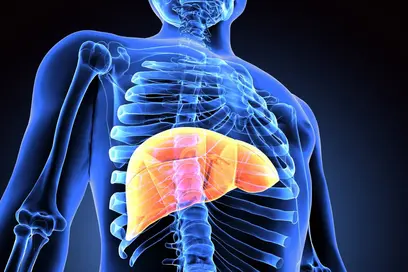Provided everything goes well, by the time a person turns 75, the heart will have pumped almost 180 million liters of blood through his or her body. To do so, it beats approximately 100,000 times a day, precisely and without any rest, in order to supply the body with oxygen and other vital substances down to its tiniest capillaries. However, up to three million people in Germany have a weary pump: They suffer from cardiac insufficiency, also called congestive heart failure, and hence from symptoms such as shortness of breath, buildup of excess watery fluid, and diminished exercise capacity. Eventually, the condition becomes life-threatening.
“It has been known for a while that congestive heart failure results in a change in metabolism,“ said Andreas Fischer from the German Cancer Research Center (Deutsches Krebsforschungszentrum, DKFZ) in Heidelberg. While healthy hearts produce their energy to more than 75 percent from fatty acids, weak hearts switch to carbohydrates as the preferred energy source. However, this link also works the other way around. In collaboration with other colleagues at the Center and at Heidelberg University Hospital, Fischer has found out that a shift from the metabolism of fatty acids as energy source to carbohydrates causes congestive heart failure.
Fischer's team identified a receptor molecule called Notch-1 as the biochemical key to this effect. The investigators had used a therapeutic antibody that acts primarily in the cells of blood vessel walls to inactivate Notch-1 in mice, thus blocking the downstream signaling pathway. The animals subsequently developed heart failure. In a further experiment, the researchers used a genetic trick and bred mice in whom they could specifically turn off the Notch-1 signaling pathway in endothelial cells, which line the interior surfaces of blood vessels. Again, the animals developed cardiac insufficiency within a few weeks.
“This obvious effect came as a surprise, even to us,“ said Markus Jabs, who is the first author of the study. But he also has an explanation ready: “For nutrients to travel from the blood vessels into the heart muscle, they must be transported through the endothelial cells.“ While the transport processes through the blood vessel wall have been studied relatively well, little is known to date about how they are controlled. The DKFZ researchers have now identified the Notch-1 receptor as a key player controlling the transport of fatty acids from the blood into cardiac muscle tissue.
“With Notch-1 inhibited, the heart has less fatty acids available and it must shift to glucose as an energy source,“ Jabs said. As a result, another signaling pathway called mTOR is activated. This causes the heart muscle to grow, eventually leading to heart failure. In an experiment, blocking this signaling pathway could prevent the development of heart failure in the mice. A diet that was extremely low in carbohydrates had the same effect.
“However, this does not mean that we should completely erase carbohydrates from our meal plan in order to prevent heart failure,“ said Fischer, who is a physician and a scientist. He is convinced that a diet containing carbohydrates does not alone cause congestive heart failure. “But our results show the immense impact that a change in metabolism, such as in inherited or acquired metabolic disorders, has on the course of congestive heart failure.“ Thus, the research team may have found an important parameter in the treatment of heart failure.
In addition, the results reported by the DKFZ researchers have far-reaching implications for cancer research. Notch-1 fulfills a wide range of functions in the body and is known to be an oncogene. Mutations that entail its increased activation can lead to the development and growth of tumors.
In theory, this makes the Notch signaling pathway an interesting target for cancer therapy. However, in a number of early clinical trials using an agent that blocks this signaling pathway, participants developed congestive heart failure. “Our results can now explain this seemingly surprising side effect,“ Fischer said. “These agents should therefore only be used under very close cardiologic control.“ The scientist also assumes that special diets or additional inhibition of the mTOR signaling pathway during treatment might help prevent the life-threatening side effect of congestive heart failure.
Markus Jabs, Adam J. Rose, Lorenz H. Lehmann, Jacqueline Taylor, Iris Moll, Tjeerd P. Sijmonsma, Stefanie E. Herberich, Sven W. Sauer, Gernot Poschet, Giuseppina Federico, Carolin Mogler, Eva-Maria Weis, Hellmut G. Augustin, Minhong Yan, Norbert Gretz, Roland M. Schmid, Ralf H. Adams, Hermann-Joseph Gröne, Rüdiger Hell, Jürgen G. Okun, Johannes Backs, Peter P. Nawroth, Stephan Herzig, Andreas Fischer: Inhibition of endothelial Notch signaling impairs fatty acid transport and leads to metabolic and vascular remodeling of the adult heart. Circulation, 2018, DOI 10.1161/CIRCULATIONAHA.117.029733
A picture is available for download
heart_cd31.jpg
Caption: Tissue section of a mouse heart: Blood vessels are stained green.
Note on use of images related to press releases
Use is free of charge. The German Cancer Research Center (Deutsches Krebsforschungszentrum, DKFZ) permits one-time use in the context of reporting about the topic covered in the press release. Images have to be cited as follows: “Source: Iris Moll, DKFZ“.
Distribution of images to third parties is not permitted unless prior consent has been obtained from DKFZ's Press Office (phone: ++49-(0)6221 42 2854, E-mail: presse@dkfz.de). Any commercial use is prohibited.



